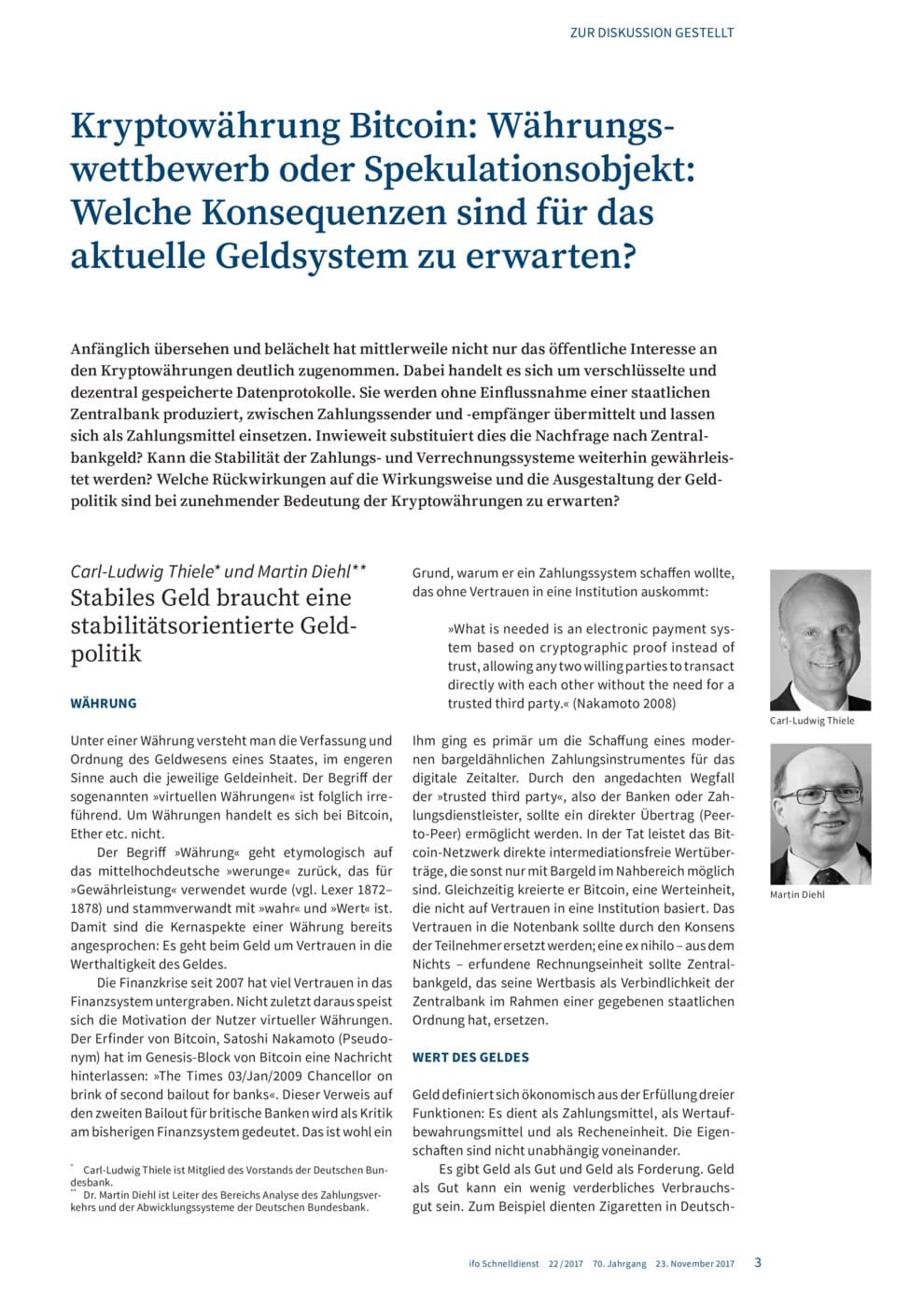Cryptocurrency Bitcoin: Competing Currency or Object of Speculation: What Are the Implications for the Current Monetary System?
ifo Institut, München, 2017
ifo Schnelldienst, 2017, 70, Nr. 22, 03-20

Public interest in cryptocurrencies, which were initially overlooked or ridiculed, has grown significantly. Such currencies are encoded and de-centrally stored data protocols. They are produced without the influence of a central bank, exchanged between payee and recipient and can be used as a means of payment. To what extent can cryptocurrencies replace central bank money? Do they threaten the stability of payment and settlement systems? What kind of repercussions will the growing importance of cryptocurrencies have on the effect and formulation of monetary policy? According to Carl-Ludwig Thiele and Martin Diehl, Deutsche Bundesbank, current virtual currencies like Bitcoin are quantitatively insignificant to date and to be viewed as an object of speculation in countries with a monetary policy geared towards stability. Bitcoin does not fulfil any of the three functions of money to an economically relevant degree as yet, since it is only used by a niche community and its value is extremely instable. Moreover, rigid algorithms for the development of the money supply will lead to a suboptimal amount of the currency in circulation. For this reason there is a need for a stability-oriented central bank to implement an active monetary policy. For Thomas Mayer, Flossbach von Storch Research Institute, the importance of Bitcoin lies less in the currency itself and far more in the technology behind it. Computer-based encoding technologies enable the seamless documentation of transfers in ownership of the currency. It is impossible to predict whether Bitcoin or another or several cryptocurrencies will end up dominating the market, but cryptocurrencies will change our monetary system thanks to their blockchain technologies. According to Dirk Elsner and Gerrit Pecksen, DZ BANK, cryptocurrencies are "not yet mature enough for widespread use." Although interest in using cryptocurrencies has grown considerably in the financial world, their impact on the payment and settlement system to date has been marginal. Recently, however, the high potential of these currencies has been both explored in research papers and has emerged in initial applications. Volker Brühl, Goethe University of Frankfurt, believes that Bitcoin and other cryptocurrencies urgently require systematic regulation and supervision. They see a danger that exchange rate developments will encourage a growing number of private investors to take an interest in cryptocurrencies. Inexperienced investors may be deceived by the term "currency". It would therefore be good for European and national supervisory authorities to take a closer look at cryptocurrencies, not just with a view to preventing money laundering, but also in the interests of protecting investors. Jochen Michaelis, University of Kassel, agrees with the monetary economists: Bitcoin will not replace the US dollar, the euro, the British Pound etc. as the dominant means of payment for a number of reasons: Bitcoin is an asset that currently has an extremely high expected yield, but which also involves extremely high risks. The opportunity costs in the form of lost appreciation "prohibit" its use as a means of exchange, and its high volatility makes stable capital transfers practically impossible overnight. Currencies are also a network good. Despite the recent hype surrounding Bitcoin, the number of Bitcoin users remains far below the critical mass that must be exceeded for the cryptocurrency to replace its established counterparts. A third point cited by Michaelis is that the long term money supply of Bitcoin has been set at 21 million units.